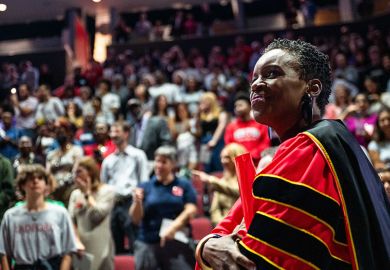Scottish National Party MPs have been urged to use their power at Westminster on higher education, in favour of a “progressive” stance on issues such as student maintenance grants and overseas students.
A fringe event at the SNP’s conference in Aberdeen also heard Carol Monaghan, the party’s spokeswoman on education at Westminster, describe how she had been “riled” when Jo Johnson, the universities and science minister, supposedly cited the universities of Oxford and Cambridge when talking about examples of research excellence.
Speakers at the event on 16 October – hosted by Million+, the National Union of Students and NUS Scotland and titled ‘How will the SNP stand up for higher education in Westminster and Holyrood?’ – noted that despite higher education being a devolved matter, England-only student funding issues had knock-on effects for Scottish funding under the Barnett formula.
The SNP has 56 MPs at Westminster.
Megan Dunn, the NUS president, said of the Westminster government’s plan to scrap student maintenance grants in England: “The Barnett consequences are huge – it could be as much as £300 million taken out of the Scottish budget because of it.”
She called on SNP MPs to oppose and challenge “when regulations [on the maintenance changes] are at some point placed down”, because “these votes will be close…we desperately need the support”.
In Scotland, the SNP has shifted maintenance grant into loans, although not abolished grants.
Ms Dunn also said: “Free education in Scotland has opened up an opportunity to make a more credible argument south of the border.”
And she added that the NUS wants to “work closely with the SNP to make sure the changes that happen in higher education over the next five years are as progressive as possible”.
Michael Gunn, vice-chancellor of Staffordshire University and former chair of Million+, said that “we need SNP MPs to take a strong interest in the forthcoming higher education Green Paper and also to question the wider impact of the Home Office’s visa policy for international students”, in areas going beyond post-study work visas, which the SNP has said should be restored.
Ms Monaghan, a member of the Business, Innovation and Skills select committee at Westminster, recalled a recent hearing at which Mr Johnson was questioned on the research budget.
“He’s very pro-science, he’s very pro-universities,” she said. “But there is a concern that the rhetoric may not match the actions when the spending review comes out.”
Ms Monaghan added that Mr Johnson had “talked about funding centres of excellence. When he said this, he then mentioned Oxford, Cambridge and Imperial. That, of course, riled me and probably an awful lot of other people in the room – across the rest of the UK, not just Scottish people.”
She called this “a very narrow-minded view and I worry about that”.
On the loss of post-study work visas, Ms Monaghan, said that it meant overseas graduates leaving Scotland and “lost expertise that we’ve provided them”. As a result, she added, innovations would be “developed somewhere else – that’s a massive loss”.
Andrea Nolan, the Edinburgh Napier University vice-chancellor, also warned that “the trajectory of UK immigration policy is a real threat”.
Vonnie Sandlan, NUS Scotland president, addressed the issue of student support in Scotland. “We speak about having free education in Scotland and we do, but only when it comes to the price tag,” she said. Ms Sandlan added there was a “need to look at the wider costs of being a student”.
Register to continue
Why register?
- Registration is free and only takes a moment
- Once registered, you can read 3 articles a month
- Sign up for our newsletter
Subscribe
Or subscribe for unlimited access to:
- Unlimited access to news, views, insights & reviews
- Digital editions
- Digital access to THE’s university and college rankings analysis
Already registered or a current subscriber? Login




